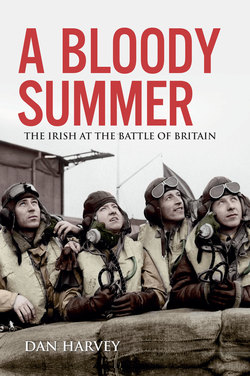Читать книгу A Bloody Summer - Dan Harvey - Страница 12
На сайте Литреса книга снята с продажи.
Оглавление2
WAR
Sunday, 3 September 1939 was All-Ireland Hurling Final day at Croke Park, Dublin. During what became known as the ‘Thunder and Lightning’ final, Cork hurling hero Jack Lynch stepped up to take a free, not far out from the Kilkenny goal. Kilkenny were one point ahead (two goals and seven points to three goals and three points) and all that was needed was for Lynch to casually tap the sliotar (ball) over the bar and bring the game to a replay. In the event, he went for the match-winning goal (three points) only to see his shot saved! A thunderous roar rose up from the ecstatic Kilkenny fans at the same time as a downpour of rain erupted over Croke Park. Meanwhile, war was erupting over Europe.
The Irish Taoiseach (prime minister) Éamon de Valera addressed the Irish people on Radio Éireann that evening, making a special announcement.
The great European powers are at war again. That this would happen was almost inevitable for a month past. Yet, until a short time ago, there was hope. But now that hope is gone. The people of Europe are thrown into the misery and anguish of war. I do not want to make you anxious but it would be a great mistake to think that life can go on here just as before – just as if this European conflict is taking place on another planet. Although we are not engaged in this terrible war, it cannot fail to bring upon us severe hardships, but there is no reason why we should be unduly anxious. As long as our people are of the one mind with regard to the national policy to be pursued, we should be able to surmount all our difficulties. United and disciplined, we have nothing to fear. A nation that has survived centuries of suffering has no need to fear or be daunted. I would like, on behalf of our government and of our people as a whole, to offer our profound sympathy to the men and women of all nations in this period of trial and suffering before them.
Hitler’s dream of an Aryan-dominated Europe saw him instruct his army to invade Poland. In responding to the gravity of this aggressive act, Britain declared war on Germany. The prior policy of appeasement adopted by British Prime Minister Neville Chamberlain and his government had proved futile against Hitler’s expansionist ambitions and his strong desire to see Nazi totalitarianism dominate.
The Wehrmacht swept through Poland using the heretofore unseen Blitzkrieg (lightning war), combining the speed and mobility of tanks, dive bombers and paratroopers in an unprecedented and overwhelming rate of advance which the Poles were unable to defend against. Germany had prepared, fine-tuned (during the Spanish Civil War) and now perfected their war machine. Massive and rampaging, the fascist Nazi regime was whirling itself westwards until finally France, too, had fallen. Only the Channel separated Britain from a similar defeat. Hitler’s war machine, modern, well trained, well equipped and well led, seemed invincible, having brilliantly demonstrated its capacity to outfight and overrun the various oppositions in much of Western Europe. Poland, Denmark, Norway, the Netherlands, Belgium and France all fell under the German jackboot. France fell on 25 June 1940 and Hitler cast his eye across the Channel. The British Expeditionary Force (BEF), having become involved in the Battle of France, was forced to retreat and undertake a humiliating evacuation from Dunkirk (Operation Dynamo) from 26 May to 4 June, where it was fortunate not to have suffered annihilation; as it was, they were forced into leaving most of their heavy equipment there. To bring matters to a neat conclusion, a combined operation would need to be undertaken in order to invade Britain in the summer of 1940 and remove them from the war, entirely. The scene was set; the Battle of Britain was beginning. Survival, freedom and democracy were at stake!
